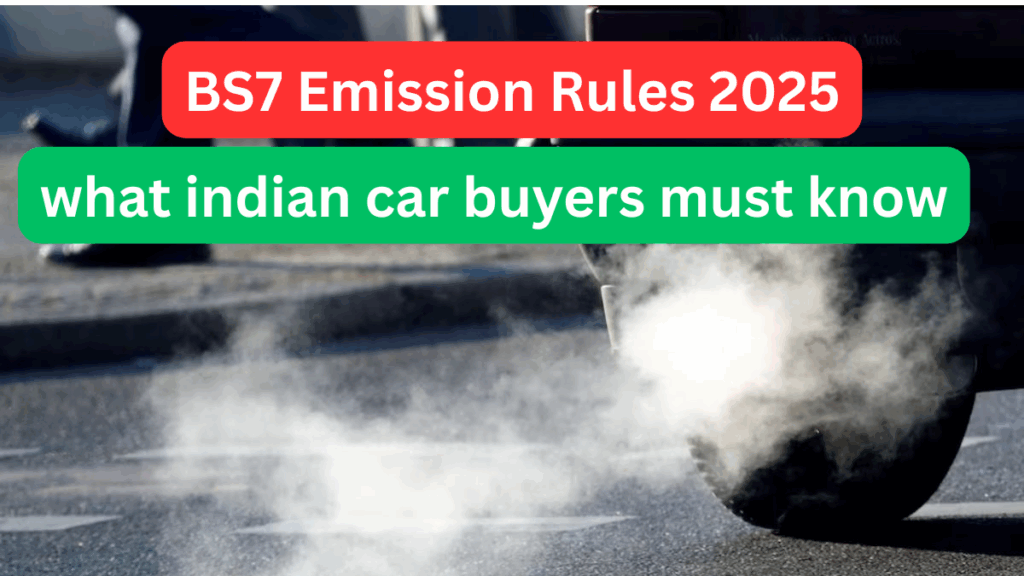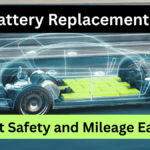The Indian automotive landscape is about to undergo another significant shift with the introduction of the new BS7 emission norms 2025 India. These updated vehicle emission standards are aimed at drastically improving air quality and making pollution control cars the norm across the country. But what does this mean for you as a car buyer or owner? Let’s break it down in simple terms.

Table of Contents
Why Are BS7 Emission Norms Being Introduced?
India has been struggling with high levels of vehicular pollution for decades. While the transition from BS4 to BS6 brought some relief, the environmental goals demand even tighter controls.
The BS7 Norms Aim to:
-
Reduce particulate matter and NOx emissions even further
-
Enhance real-world driving emission testing
-
Promote cleaner fuel technologies
-
Encourage hybrid and electric vehicle adoption
With rising concerns over global warming and urban air pollution, vehicle emission standards like BS7 are more than just regulations—they’re necessary steps toward a sustainable future.
What Are the Major Changes in BS7 Norms?
The new BS7 emission norms 2025 India are expected to be significantly stricter than BS6 Phase 2 norms. Here’s a breakdown:
Feature |
BS6 (Current) |
BS7 (2025 Onwards) |
|---|---|---|
Emission Limits |
Moderate |
Much stricter for NOx, CO2, and PM |
Real Driving Emission (RDE) Test |
Introduced in BS6 Phase 2 |
Stricter and more dynamic conditions |
Onboard Monitoring System |
Basic OBD systems |
Enhanced OBD with live emission tracking |
Fuel Efficiency Targets |
Average improvements |
Higher efficiency mandatory |
Focus |
Engine-based emission control |
Full-vehicle approach incl. electronics |
These enhancements will ensure that pollution control cars become smarter, cleaner, and more aligned with international standards.
Impact on Indian Car Buyers
The transition to BS7 will affect both new buyers and existing vehicle owners in different ways. Here’s what you need to be prepared for:
For New Car Buyers:
-
Expect price hikes due to new tech and engineering costs
-
Wider availability of hybrids and EVs
-
Smarter, cleaner vehicles with advanced emission control systems
-
Fewer diesel options, as manufacturers may phase them out
For Existing Car Owners:
-
Older BS4 and some BS6 vehicles may face resale value depreciation
-
Potential restrictions on older vehicles in major cities
-
No need to panic—BS7 does not make existing vehicles illegal
How Automakers Are Preparing?
Major automobile manufacturers are already in the process of developing engines that meet the BS7 guidelines. Many are investing in:
-
Hybrid and electric platforms
-
Advanced combustion technology
-
Real-time emission monitoring systems
These advancements not only support pollution control cars but also improve performance and fuel economy, giving buyers better value for money.
What Should You Do Now?
If you’re planning to buy a new vehicle between now and 2025, here’s what you should consider:
Buyer Tips:
-
If possible, wait for BS7-compliant models post-2025 for better long-term value
-
Consider hybrids or EVs for a future-proof investment
-
If buying now, ensure you get a BS6 Phase 2-compliant vehicle
-
Be aware of government incentives on green vehicles
Summary Table: BS7 Norms at a Glance
Aspect |
Details |
|---|---|
Implementation Year |
April 2025 (expected) |
Affected Vehicles |
All new cars and two-wheelers |
Major Features |
Stricter emission norms, enhanced testing, cleaner engines |
Buyer Impact |
Higher prices, better tech, cleaner options |
Industry Impact |
Shift to hybrid/electric, costlier R&D |
Frequently Asked Questions (FAQs)
1. Will BS7 norms ban existing BS6 cars?
No. BS7 norms apply only to new vehicles sold after the implementation date. Existing cars will still be allowed to operate.
2. Should I wait for a BS7 car or buy now?
If your purchase isn’t urgent, waiting for BS7 cars in 2025 may offer better long-term benefits in terms of emissions and resale value.
3. Will BS7 cars be more expensive?
Yes, vehicles complying with BS7 standards are expected to cost more due to added technologies and compliance systems.
4. How do BS7 norms help the environment?
BS7 norms reduce harmful emissions like nitrogen oxides and particulate matter, supporting cleaner air and sustainable urban living.
Final Thoughts
The new BS7 emission norms 2025 India are a crucial leap toward cleaner mobility and a healthier environment. As a car buyer, staying informed helps you make smarter, future-ready choices. Whether you’re eyeing a new car now or planning for 2025, the key is to balance cost, performance, and environmental responsibility.
Click here to learn more





